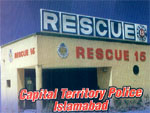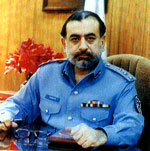 |
||||||||||
|
|
||||||||||
|
|
||||||||||
 |
|
Message From Senior Superintend of Police. Islamabad |
||||||
 |
||||||
 |
||||||
|
Nasir Khan Durrani (PSP) |
||||||
|
SOCIAL SERVICE ROLE OF POLICE PREAMABLE AND RATIONALE The accumulation by the police over time of a broad range of "social services" functions has received considerable attention by social scientists and police commentators. A large part of the literature of late has concerned itself especially with the role of police into domestic crisis situations. This involvement has been brought about by police demand for public presence and the lack of any other 24 hour immediate responsive, authoritative service. As the demand for and volatile nature of, this aspect of their role has become more fully appreciated, both through the internal analysis of policing systems and the focus of attention of social scientist, domestic crisis intervention training for police personnel has developed. In the past decade this has become, in varying degrees, an acknowledged part of police training curricula in many American, and increasingly, Canadian police departments and academies. The interest of social scientist in police work that has emerged in recent years has produced a body of literature replace with psychological and sociological studies of the police and the policeman's role. Frequently, attention is drawn to a difference in police work between law enforcement: a function which focuses on specific law violations and involves actions which lead to arrest or summons with fairly clearly defined guidelines: and order maintenance : a more ambiguous and problematic police function involving the management of interpersonal behavior with few specific guideline as to what order is or how to establish it. The distribution has been developed in the literature in various ways: Banton' refers to " peace officers and law officers", Bittner writes in about "Peace keeping and law enforcement" Skolnick refers to the part played by street policemen in " Law enforcement" as compared with " service and order maintenance" Wilson comments on the distinction as follows: The difference between order maintenance and law enforcement is not simply the difference between " little stuff" and "real crime". The distinction is fundamental to involve quite dissimilar police actions and judgements. Order maintenance arises out of a dispute among citizens who accuse each other of being at fault: law enforcement arises out of the victimization of an innocent party by a persons whose guilt most be proved.... Because an arrest can not be made in most disorderly cases, the officer is expected to handle the situation by other means and on the spot, but the law gives him the right to do anything at all other than make an arrest... Alone, unsupervised, with no policies to guide him and little sympathy from onlookers to support him, the officer must "administer justice"at the curbstone. Not only has this distinction been drawn but it has been demonstrated by many writers that, contrary to popular throught, the major part of a policeman's role(50 to 80 percent of his time) is comprised of performing non-criminal, order maintenance or "social" duties. Bercale reports that only 16 percent of calls to the Detroit Police Department emergency number were requests were calls for assistance in non-criminal matters. Lundman cites other United States studies in Britain by Punch and Naylor showed that 59 percent of calls to the police in three Essex towns could be defined as "service" request and the remaining 41 percent as requests relating to law enforcement. THE POLICE SOCIAL SERVICE ISLAMABAD: The accumulation by the police over time of a broad range of " welfare" or "service" functions is largely the result of citizen request for their involvement. Black and Reiss state. "The Police far more often are initially mobilized through the action of private citizens than through police initiative". In their study of three major United States cities, some 80 percent of all mobilizations were the result of a citizen call to the police station, and only 16 percent were traced to police initiated intervention. While the police themselves may regret this aspect of their involvement, the reluctantly accept that by and large there since is no other community resource capable of responding to this public demand. The studies from theUnited States, Britian and Canada chiefly cited above make the generalisation that community social agencies provide a 9 a.m to 5 p.m weekday service for 5 p.m to 2 a.m weekend and social problems. As Bard points out the domain of the police is crisis, their mode is immediacy (a highly organised mobile response), and their essence is authority.( They have the power to " do something.) In Pakistan there is no second option that the public is not satisfied with the working of police and consider them unprofessional and inefficient. They also hold them responsible for the increase in crime and deteriorating law & order situation. If this perception is analyzed and compared with the crime state in other modern countries it whould be quite amazing to note that the incidence of crime in all advance countries is more then the crime in Pakistan. Similarly the detection rate in Pakistan is also fairly reasonable. It may be interested to compare the crime figures of UK having a population of 55million with the Crime State in Punjab having population of around65 million. In England the total crime per hundred thousand population comes to 9727 as compared to 327 in Punjab. The incident of burglaries and theft and burglaries per hundred thousand population is 2249 as compared to 152 in Punjab it is around 40 to 45%. The objective of quoting all these figures is only to get this point registered that the reason of dissatisfaction of general public with the police is not because of its inefficiently or unprofessionalism. It is mainly because of its attitudinal problem. In Pakistan we are still following the legacy of colonial policing which is coercive in style. We are still considered to be a tool of oppression in the hands of the Government in power. This is high time that we must change the present policing style and adopt such strategies which can earn respect and recognition of the public for the service Police. Realizing the need of the day, Islamabad Police has introduced the Rescue 15 Project for the convenience of the public is on the lines similar to Rescue services implemented around the world. This Centre is presently housed in G-8 Sector near P.M Housing Scheme Islamabad. It was formally inaugurated by Lt. Gen. (Retd.) Moin-ud- Din Haider, Minister for Interior on 17th February 2000. This Centre is equipped with all modern communication gadgets and Rescue facilities. This Project is a unique example of police public co-ordination. Entire expenditure for its establishment was incurred by the philanthropist organizations and therefore no extra burden was levied on Government exchequer. It has completed almost 3 months of its operation and the with the Grace of Allah we can confidently say that it has not really improved our image in the eyes of public but has also reduced the heinous crime. DATED: JUNE, 2000. |
 |
|||||
|
Nasir Khan Durrani (PSP) |
|||||
| Senior Superintend of Police. Islamabad | |||||